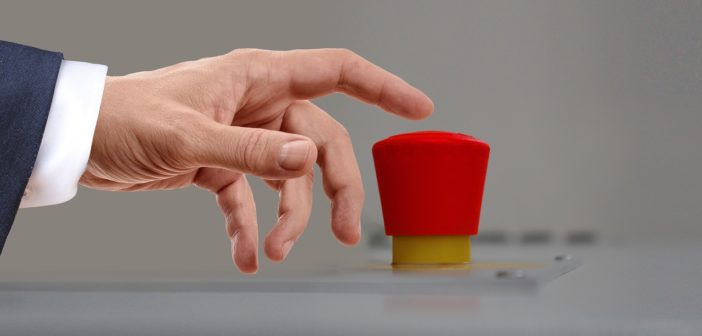Warning: this post contains ideas that some people may find irritatingly optimistic, as well as some big, long-term ideas that some may find ludicrous. Please set your mind to “open” before reading further. 🙂
I often hear people entertaining the thought of making humanity disappear from the universe because, as a species, we are cause a lot of suffering to ourselves, other sentient beings and the planet. One thought experiment goes like this: if you could make humanity painlessly disappear with the pressing of a button, would you press it? Or, slightly reframing the experiment so that you can make an abstraction from your own responsibility: would you stop someone else from pressing the button?
In the animal rights/vegan movement, more people seem to be in favor of human extinction than among the general population (just my anecdotal experience). That’s not hard to understand. People become animal rights activists and/or vegans because they have learned about the horrible suffering humans inflict on animals for food, clothing, research or entertainment. It is tempting to think that the planet would be a better place without Homo sapiens, and given that in our thought experiment, no humans would really suffer (it’s just a matter of an instant, and no humans are left to deplore the new situation), we might say: where’s the harm?
Now, from the viewpoint of the notoriously tricky field of population ethics, there’s a lot of stuff to say here. Apart from the consequences for other species and the environment, we could talk about whether the universe in general is a worse or a better place with humans gone. If there is, on average, more value than disvalue in humans’ lives, it might seem that the net result is negative. But if there’s more misery than happiness, this could be good. We could also think about the value of future people being born. They will obviously not be born if we let humanity go extinct. I won’t go into this minefield here, as I do not have strong opinions about these issues, because I can’t seem to wrap my head around them, and mainly because here I want to touch on some other factors.
These are the reasons why I would not press the button.
1. Humans may do a lot of damage, but they’re also wonderful.
We all know the horrors that we cause in the world, both to other people and to 65 billion farmed animals annually (excluding fish). We screw up our environment and use a lot of finite natural resources. There’s no need to write a long and depressing list here. However, we can also focus on all the good that we do. Never in the history of our planet – or, as far as we know, the universe – has there been a species that invests so much time in making things better for others. Look at the millions of people active in the non-profit sector. Look at those trying to help the weakest and the poorest. Look at all the beautiful things we do. Seeing Homo sapiens in this light, it becomes really problematic and unfair to just call us a shipwreck of a species that only does damage.

2. Humans still have a lot of potential to improve.
In many ways our history is just beginning. If you think in terms of the history of life on Earth, mere moments ago we were apes in trees. We developed culture, learning and education only recently. We – in richer countries at least – only recently managed to create comfortable environments where we no longer need to worry about food and shelter, so that we can spend more time on other things. Violence is declining and this era is, counterintuitively to some, the most peaceful era in history (read Steven Pinker’s The Better Angels of Our Nature for more on this). We’re still expanding the circle of our moral concern. We’ll probably have to work less in the future and will devote even more time to creating change for ourselves and others. And there is the promise (at least for techno-optimists) of future technological advancements that can help us have a huge positive impact on ourselves and our planet.
3. Humans might be able to help other species further down the road.
In the future, given more moral growth and technological improvements, rather than having a net negative impact on other species, our impact could become net positive. Arguably the biggest source of suffering for animals is nature or the natural condition. Animals die by the billions because of hunger, disease, parasitism, the climate and predation (see my post The extremely inconvenient truth of wild animal suffering). Maybe in the future, we can limit some of this suffering.
The same applies if at some point in our more distant future, we bump into sentient life on other planets. Chances are there is suffering there, and if by that time we have advanced enough morally and technologically, we may be able to help. Of course there is the chance that some other species in our corner of the universe is already at that level, thus making our own progress less important. But certainly in the event that we’re the only “advanced” ones around (in this region of the universe), it becomes very important that we survive and grow to help. It would be a pity if everything we have and everything we are was lost, and the universe would need to restart with another species to reach our level of development. Lots of time and lives lost.
As you see, I’m thinking a bit ahead. And why not? Some will believe this is speculation and science fiction that has no relevance for the problems and suffering at hand. But if we don’t destroy ourselves, we have to assume we’re going to be here for a long, long time still. And in that time, a lot is possible.
We’re on our way. We’re children still, growing up, getting better. It’s going to take ages or millennia, but we humans might just turn out to be the best thing for the universe. Let’s not press that button just yet.
Featured image: would you press the button? Image via Pixabay.





